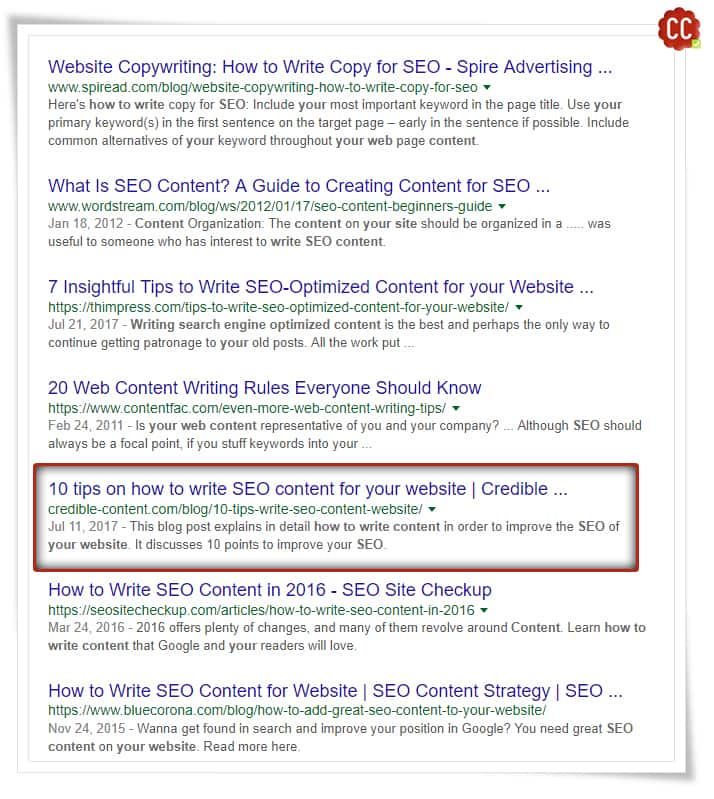This blog post contains 5 content writing tips to improve your SEO including
- Do thorough keyword research before starting content writing
- Decide to focus on the quality of your content
- Use the title and the headlines in your content writing to improve your SEO
- While writing content, focus on the structure of your content too
- Use content writing to create longer web pages and blog posts to improve SEO
The purpose of content writing isn’t just to improve your SEO but it is one of the major advantages of effective and engaging content writing.
These content writing tips to improve SEO will explain to you that at the crux of every SEO endeavor lies effective, quality content writing.
If targeted, quality content writing doesn’t exist, your SEO doesn’t improve, and by a fluke, even if it does, it solves no purpose.
What does improving SEO with content writing mean?
Being a content writer and a content marketer I am always aiming at improving my clients’ conversion rate.
Read: More sales with Credible Content Writing Services.
Not being merely an “SEO expert”, for me, improving SEO means getting search engine traffic that converts.
It’s no use ranking high for your keywords and search terms if people coming from search engines don’t buy from you.
So, for me, improving SEO with content writing means:
- Writing highly effective and convincing content for your website or blog that makes your visitors do business with you (which means, you have a great conversion rate).
- Getting higher rankings for keywords and search terms that bring you business-ready search traffic.
One needs to strike a balance.
If you have great content but if that content doesn’t rank high on search engines, it becomes difficult for people to find it and if people can’t find it, they are not going to come to your website.
Read: What is quality content and how does Google recognize it?
On the other hand, even if you get good search engine rankings for your favourite keywords, unless this traffic converts into business for you, it solves no purpose.
Improving SEO with content writing should strike a perfect balance between improving your search engine rankings as well as improving your conversion rate.
Read: How to strike a balance between SEO and quality content writing.
How do I do that? How will my content writing improve your SEO?
5 content writing tips to improve SEO
Content writing that improves your SEO is quite straightforward because the ranking algorithms, especially those that rank links in Google, are quite straightforward.
Here are 5 content writing tips that will help you improve your SEO in a balanced manner so that you get higher search engine rankings as well as higher conversion rate:
1. Do thorough keyword research before starting content writing
Thorough keyword research solves two purposes:
- Helps you incorporate the right keywords into your entire content writing process.
- Keeps you focused.
Why does thorough keyword research keep you focused?
Keyword research here means listing as many longtail keywords related to your business as possible.
Remember that when you’re writing content for your business you want to solve people’s problems.
You want to provide answers to their questions through your content writing.
People these days don’t use small phrases. They use longer expressions to find precisely the information they are looking for.
For example, if a person wants to promote his accounting business through content writing he won’t simply look for “content writing service”; he will look for “content writing service for my accounting business“.
Therefore, if I want people who are looking for a content writing service for their accounting business to find my website, I will be writing a few webpages or blog posts specifically addressing this issue – “content writing service for accounting business”.
Similarly, I have a page on “content writing service for real estate business” rather than simply, again, “content writing service”.
Another example: content writing service to improve your SEO.
This sort of content writing that uses your longtail keywords definitely improves your SEO and also helps you create content people are actually looking for, rather than random terms very few people might be looking for.
Here is a nice HubSpot blog post that lists 9 best keyword research tools to find the right keywords for SEO.
Here is from none other than Moz: How to do keyword research – The beginners guide to SEO.
2. Decide to focus on the quality of your content
Yes, even at the cost of improving your SEO.
When it comes to content writing to improve your SEO, the quality of your content takes precedence over your SEO effort.
No matter what, decide that you’re going to stick to your quality standards because, if your content doesn’t convert, no amount of SEO can help your business.
When writing content for the first time if you don’t want to bog yourself down with your keywords, don’t bother.
Create well-written webpages and blog posts first.
Remember that you need to solve people’s problems.
They have got a problem and you have got a solution.
If you stick to this philosophy, in more than 90% of the cases you will be automatically taking care of your keywords.
Even if at the time of writing you cannot write around your keywords, once you have written content that is good for your visitors, you will be easily able to incorporate your keywords.
Read: Choosing the right keywords for content marketing.
3. Use the title and the headlines in your content writing to improve your SEO
The title of your webpage or blog post is the sum total of what you’re going to communicate through your webpage or blog post.
For example, you clearly know what this particular blog post is going to deliver to you: 5 content writing tips to improve SEO.
Decide a central keyword or a search term and weave your title around that.
For Google, make sure that your title does not exceed the 60-character limit because this much is what is visible in the search engine results.
It is always good to address the main issue within the title of your webpage or blog post because this is going to appear as a hyperlink.
For example, on Google if you search for “how to write SEO content for your website” this is a sample of some of the results:
If the hyperlink addresses the central issue of the search query people click the hyperlink more.
Organize your text under various headlines to make it easier to skim your webpage content.
As you will easily notice in this blog post, it contains various headlines and then these headlines are followed by text details.
You can use this opportunity to use your keywords because the Google search algorithm takes the keywords within the <h1>, <h2>, <h3>, etc. tags seriously.
4. While writing content, focus on the structure of your content too
I have slightly touched upon this topic in the above heading: use the headline tags to organize your text.
Aside from using headline tags you can also use bulleted points, bold text and anchor text of your hyperlinks to improve your SEO.
As you keep publishing blog posts and webpages, you will have plenty of content to link to.
For example, if you have already written about a topic and you need to mention the topic in your current blog post.
Instead of writing about the topic all over again, you can simply link to the topic using the appropriate anchor text for the hyperlink.
Something like: In this blog post I’m writing about 5 content writing tips to improve SEO, but if you have no idea what SEO is, you may like to read SEO content explained.
Since I already have a web page that explains what is SEO content, there is no need for me to rewrite the entire explanation.
You can link to your previous content in similar manner.
5. Use content writing to create longer webpages and blog posts to improve SEO
You must have noticed that these days my blog posts are rarely less than 1000 words.
Google prefers longer blog posts and articles because
- They can pack lots of information about a single topic.
- It takes hard work to write longer webpages and blog posts.
Thin content no longer works.
There was a time when people would write 200-400-word articles and blog posts and they would enjoy good search engine rankings.
This encouraged lots of junk content that had no meaning.
Also, since it is easier to create smaller webpages and blog posts, people who wanted to spam search engine results would indulge in lots of trash content writing.
Because of this, Google has started preferring longer webpages and blog posts because it takes hard work to write them.
You must have a lot to say to be able to write a 1500-word webpage or blog post.
You must be an authority on the topic.
Authority is good.
Google likes authority.
There can be many content writing tips to improve SEO but the tips that I have listed above basically sum up your entire effort to improve your search engine rankings through content writing.
In order to improve your SEO keep your content writing as relevant as possible.
I cannot stress this point enough that it’s the quality that matters.
Writing your content around your keywords is of course necessary, but this isn’t the only factor that impacts your SEO.
Search engines these days also need human validation and human validation can only come through relevant, quality content writing.


